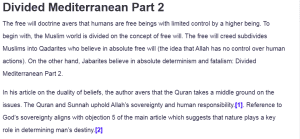Divided Mediterranean Part 2
The free will doctrine avers that humans are free beings with limited control by a higher being. To begin with, the Muslim world is divided on the concept of free will. The free will creed subdivides Muslims into Qadarites who believe in absolute free will (the idea that Allah has no control over human actions). On the other hand, Jabarites believe in absolute determinism and fatalism: Divided Mediterranean Part 2.
In his article on the duality of beliefs, the author avers that the Quran takes a middle ground on the issues. The Quran and Sunnah uphold Allah’s sovereignty and human responsibility.[1]. Reference to God’s sovereignty aligns with objection 5 of the main article which suggests that nature plays a key role in determining man’s destiny.[2]
The author primarily relies on the Quran and Islamic scholarly sources to drive his point. In conclusion, the author compares the validity of the two arguments against Quran teachings and emphasizes a middle ground.
On the other hand, the Christian worldview strictly entrenches the belief that there is no free will. Although God initially gave man the freedom to do as he wished, that changed after humans sinned, turning away God’s favor. Augustine mostly relies on medieval Christian books to drive his point. One of the lessons drawn from Augustine’s insights is that God is not responsible for sin.
Although He gave man the will to do as he wills, sinning is exclusively a human choice.[3] Unlike the Islamic perspective, which examines the two viewpoints on free will, the Christian perspective mostly reinforces an existing ideology in the debate. The major conclusion is based on Proverbs 21:1: “The heart of the king is in the hand of the Lord; whithersoever He will, He shall turn it.” [4]
Bibliography
www.newadvent.org. “SUMMA THEOLOGIAE: Free-Will (Prima Pars, Q. 83),” n.d. https://www.newadvent.org/summa/1083.htm#article1.
[1] “SUMMA THEOLOGIAE: Free-Will (Prima Pars, Q. 83),” www.newadvent.org, n.d., https://www.newadvent.org/summa/1083.htm#article1.
[2] SUMMA THEOLOGIA
[3] Ibid
[4] Ibid
ORDER A PLAGIARISM-FREE PAPER HERE
We’ll write everything from scratch
Question 
For this assignment, we are going to look at two scholars on opposite sides of a different divide. In this module, you will find two treatises on the question of free will – one from a Muslim theologian and one from a Christian. I want you to compare and contrast these two works in terms of structure, method of argument, the sources they cite, and their conclusions about whether or not humans possess free will.

Divided Mediterranean Part 2
Please quote directly from both sources in your answer.
- ONLY USE LINK PROVIDED TO ANSWER QUESTION